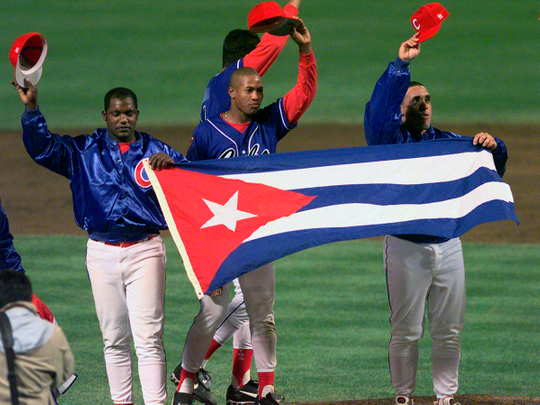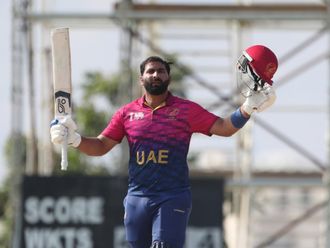
Washington: Cuba’s impressive baseball talent will no longer have to risk defection and human trafficking to play for American clubs under a deal announced Wednesday after three years of negotiations.
Major League Baseball, its players’ union and the Cuban Baseball Federation made a groundbreaking agreement that will allow players from the Communist island nation to sign with North American teams despite political strains between the US and Cuban governments.
The MLB-Cuba deal would install a posting system similar to those used by MLB with Japanese, South Korean and Taiwan leagues when players want to jump to the richer deals of the major leagues.
For decades, Cuban officials have sought to keep players on homeland sides and their powerhouse national amateur squad. Players have been forced to defect, often making deals with shady characters and forced into human trafficking to escape Cuba, forced to go to other nations before being able to sign as free agents with Major League Baseball clubs.
One of today’s top Cuban-born MLB players is White Sox first baseman Jose Abreu, who defected in 2013 and hailed the new deal.
“Words cannot fully express my heartfelt joy and excitement,” he said. “Knowing that the next generation of Cuban baseball players will not endure the unimaginable fate of past Cuban players is the realization of an impossible dream for all of us.
“Dealing with the exploitation of smugglers and unscrupulous agencies will finally come to an end for the Cuban baseball player. To this date, I am still harassed.”
Under the agreement, the Cuban federation must release all players who are age 25 with six years of experience and may also release younger talent. Players can negotiate and sign with major league teams without leaving Cuba, with the federation collecting a release fee for any players signed by MLB clubs.
Players will have standard US work visas allowing players and their families to travel and return to Cuba if they choose. Players would keep the money they earn rather than seeing much of it go to Cuban officials as under past deals for Cuban talent in Asian leagues.
“The next generation of Cuban baseball players will be able to sign an MLB contract while in Cuba, they will be able to keep their earnings as any other player in the world, they will be able to return to Cuba, they will be able to share with their families, and they will be able to play the sport they love against the best players in the world without fear and trepidation,” Abreu said.
No more risky defections
Prime examples of Cuban players’ hunger and hardships to reach the major leagues are Livan and Orlando “El Duque” Hernandez, both star pitchers in their youth.
Younger brother Livan defected in 1995, planning an escape through Mexico with recruiter Joe Cubas. In 1997, Livan would help the Florida Marlins win the MLB crown, earning World Series Most Valuable Player honors.
Orlando Hernandez, in the wake of his brother’s defection, was left off Cuba’s 1996 Olympic gold medal team. On Christmas Day in 1997, Orlando defected in a small boat near the Bahamas and was eventually offered asylum in Costa Rica, making him a free agent and setting up a $6.6 million deal with the New York Yankees, with whom he won World Series titles in 1998, 1999 and 2000. he late won another in 2005 with the Chicago White Sox.
“For years, Major League Baseball has been seeking to end the trafficking of baseball players from Cuba by criminal organizations by creating a safe and legal alternative for those players to sign with major league clubs,” said MLB commissioner Rob Manfred.
“We believe this agreement accomplishes that objective and will allow the next generation of Cuban players to pursue their dream without enduring many of the hardships experienced by current and former Cuban players who have played Major League Baseball.”
Cubans need no longer risk their lives to follow their baseball dreams, said MLB Players Association executive director Tony Clark.
“Establishing a safe, legal process for entry to our system is the most important step we can take to ending the exploitation and endangerment of Cuban players,” he said. “The safety and wellbeing of these young men remains our primary concern.”
‘Migrated’ players can return
The Cuban Baseball Federation version of the announcement emphasized it would allow Cubans to play “without discrimination, in equal terms, in the MLB, without being compelled to break their ties of any kind with their country.”
The Cuban announcement of the deal said it would allow for the return of Cubans who “migrated to third countries with the purpose of trying to reach the major leagues and that for several reasons haven’t achieved it, saying “they will be able to be reinserted in the Cuban national competitive system.”
The Cuban announcement noted it will not change things for those who have already departed Cuba for the major leagues, saying the deal begins “from the moment the accord is signed. Like all agreements, it does not imply a retroactive recognition of prior circumstances.”











